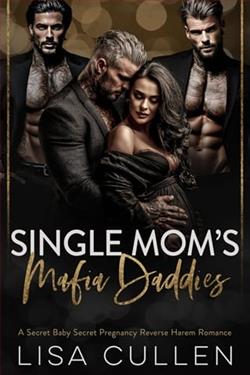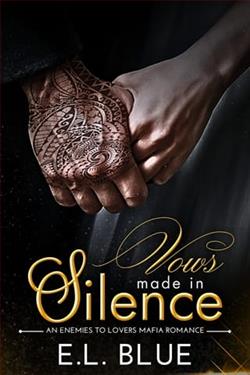Page 2 of The Best Husband Money Can Buy
Not wanting to leave the pages of the condolence book so desolately blank, she used the pencil lying in the middle to write her name and the address of the Garfields’ house. After a moment’s thought, she also printed out the words of the Twenty-Third Psalm.Yea, though I walk through the valley of the shadow of death, I will fear no evil, for Thou art with me….
After she finished the psalm, she left the church, walking hastily, for it was almost dark. But the sense of peace stayed with her. It was true that she did not have the comfortable life with husband and family that she had grown up expecting, but she was alive and healthy and she’d never gone hungry.
Counting her blessings, she hurried home.
* * *
Five days after Emma received the invitation to Harley, a footman interrupted her French lesson with the two Garfield daughters. “The mistress wants you to come downstairs,” he said slyly. “You have a caller.”
“For me? How odd.” Wondering who could possibly want to see her, Emma got to her feet. “Letty, Isabelle, work on your translations until I return.”
Letty rolled her eyes elaborately while her younger sister giggled. The two girls were unrewarding students, interested only in clothing and endless speculations about the men they would someday marry. They were also idle and spoiled by their mother. Emma hoped that in time she would be able to inspire them with some respect for learning, but she wasn’t optimistic.
“Maybe Miss Stone has a gentleman caller,” Isabelle whispered.
Letty sniffed. “An old thing like her? Hardly.”
Emma didn’t know if she was supposed to hear the interchange or not, so she decided to ignore it. Still, her color was high when she went downstairs.
Mrs. Garfield was seated in the drawing room with a silver-haired gentleman on the chair opposite. As he got his feet, she said with obvious disapproval, “Mr. Evans insists that he must speak with you privately about a most important matter.” Her eyes narrowed to slits. “I’ll have no goings on in my house, miss.”
Mr. Evans said in a formidably well-bred voice, “I assure you, Mrs. Garfield, my business with Miss Stone is entirely professional.” His tone was enough to rouse Mrs. Garfield and send her from the room. Then he turned to Emma.
“Sir, are we acquainted?” she asked, her brow furrowed. “If so, I’m afraid that I have forgotten the circumstances.”
He smiled and looked much more approachable. “We are not acquainted, Miss Stone. I am a solicitor with news I think you will welcome. Please, do sit down. This will take some time.”
Welcome news? As Emma settled on the sofa, she tried to think of any aged relations who might have left her a legacy, but without success. The rich Vaughns all had closer kin to leave their money to.
The solicitor resumed his seat. “First, are you the Emma Stone who five days ago left your name in the condolence book of Mr. Harold Greaves at the church of St. Pancras in the City?”
Startled, she said, “Yes. I’m sorry, I meant no harm. Is there some family member who was offended by a stranger praying for Mr. Greaves?”
“Quite the contrary. Mr. Greaves was a widower. He and his wife had no children, and there are no other close kin.” Mr. Evans paused, his eyes distant. “He and his wife were very close. After she died several years ago, Harold became something of a recluse. They were both good friends of mine as well as clients.”
“I’m sorry for your loss,” Emma said politely. She managed, barely, not to ask what this had to do with her.
“My friend left a most unusual last will and testament. He said that because he had no surviving family, anyone who freely prayed for his soul would receive ‘the sum total of his worldly goods.’” The solicitor smiled. “You were the only one to sign the condolence book. Therefore, Miss Stone, you are the sole heir of Harold Greaves, merchant of London.”
“Simply for spending a quarter of an hour in prayer?” Emma said incredulously.
“It was a quarter hour that no one else spent,” Mr. Evans pointed out. “Harold always had a great appreciation for disinterested goodness. He would be happy to know that you prayed for no other reason than the simple caring of a good heart.”
Emma held very still, trying to absorb the solicitor’s announcement. Merely because she had chanced to wander into that small church, then spent a few minutes praying, she was now an heiress. She wondered how much Mr. Greaves had left. It would be a great blessing to have several hundred pounds as a cushion against unemployment or illness. Even fifty pounds would be very welcome.
Mr. Evans said jovially, “Aren’t you going to ask how much you will inherit?”
Emma colored. “I’m curious, of course, but it seems rather vulgar to ask. I assume that you wouldn't be here unless there was some amount left after paying Mr. Greaves’ funeral expenses.”
“There is indeed.” Mr. Evans paused portentously. “It’s too soon to give an exact figure, but it is safe to say that your inheritance will be about one hundred thousand pounds.”
Emma’s jaw dropped. Sure she had not heard correctly, she repeated, “You said…one hundred pounds?”
The solicitor chuckled. “You didn’t mishear. The estate is approximately one hundred thousand pounds. You are now one of the wealthiest young women in Britain, Miss Stone.”
There was a roaring in Emma’s ears, and for a moment she thought she would faint. A hundred thousand pounds! The daughter of the richest banker in Britain had gone to her husband with a dowry of one hundred thousand pounds. It was a fortune that would not disgrace the daughter of a duke.
Could this be some kind of dreadful joke at her expense? Her gaze went to the solicitor’s face. Sober, respectable, patently honest. Exactly the kind of solicitor that a rich merchant would have. She tried to clear her throat, but her voice still came out as a squeak. “Excuse me, sir. I…I’m having trouble taking this in.”
“Naturally. Strokes of fortune such as this are life-changing.” He cocked his head to one side. “Do you have any idea what you will do with your inheritance?”
The question focused Emma’s churning thoughts. “I wish to tithe a tenth of the amount to charity. For the widows and children of our gallant soldiers who died fighting Napoleon, I think.”
“Very proper,” Mr. Evans said approvingly. “What else?”
Emma could travel to Italy and Greece and all those wonderful, exotic places that were no more than names on the map. Buy a house, or an estate. Do a thousand things.
Did she want to do them alone? She realized with shock that she had just been given the chance to obtain the most powerful desire of her heart—a home and family of her own. She could once more have a place where she belonged.
Struggling to control her excitement, Emma said, “I’m going to get myself a husband, Mr. Evans. The best husband money can buy.”















